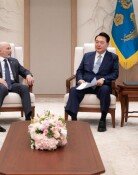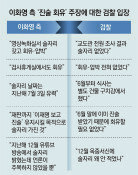President`s address includes dissolution of Coast Guard
President`s address includes dissolution of Coast Guard
Posted May. 21, 2014 02:24,
To what extent will the retired officials be restricted from being appointed as public service-related organizations? (Reporter)
Reality should be taken into account. Not too many organizations will be subject to such a restriction. (An official from a department in charge of public office reforms)
Although President Park Geun-hye has affirmed her willingness to eradicate the buzzword "Gwanfia" in Korean, or a bureaucratic Mafia, public officials preparing the systemic reforms have already started to minimize the scope of the reforms. Given that public officials were always good at coming up with an opposite logic whenever there was an attempt for reforming public offices society, many concern that the willingness for the reforms may lose its momentum as related authorities continue to stall time.
○ Some argue limiting re-employment is unconstitutional
The government has decided to select 27 follow-up measures and confirm them by the end of this year in order to deal with the tasks, such as the government reshuffling, reforms of public offices, handling of the Sewol ferry disaster and establishment of national safety ministry, which are included in the Presidents address to the nation. Accordingly, the government says it will speed up its reform efforts by developing key policies to extend the restriction period for retired public officials re-employment in related agencies from two years to three years and expand organizations subject to such restriction.
In the process of detailed coordination, however, officials of the Ministry of Security and Public Administration, the Ministry of Strategy and Finance and the Office of Government Policy Coordination, departments, which actually prepare these policies, suggest that there should be a need to adjust the pace. They argue that legislating based on the presidential remarks may raise the issue of unconstitutionality and that such change will discourage people who want to be public servants, causing labor shortages in public administration.
For instance, if the presidential remarks were enacted as a law without any adjustment, all high-ranking officials retired from the Ministry of Strategy and Finance could not be re-employed by all of the 298 public agencies. According to the presidents address, the work scope of an official is determined not by the team but by the ministry that he belonged to. In other words, the work scope of the ministry he worked for becomes the basis when judging his works relevance to the business of a company that he wants to work for. This way, officials who work in the Tax and Customs Office, Economic Policy Bureau and Treasury Bureau of the Finance Ministry also cannot work for public agencies after retirement because those in the Public Policy Bureau under the same ministry deal with the evaluation of public agencies.
Some public officials argue that extensively limiting the scope of companies that they can work for after retirement infringes the constitutional freedom to choose a job. Lee Cheol-soo, professor of the School of Law at Seoul National University, says, Given the special characteristics of public posts, there is a need to apply stricter standards for reemployment compared to ordinary people. But when developing detailed standards such as a restriction period, legal principles should be thoroughly reviewed.
○ Open recruitment of fifth grade public officials will be reduced
Regarding the presidents commitment to not appointing public officials as a head or auditor of a public service-related organization, people have different opinions about the scope of the public service-related organizations. Under the current Public Service Ethics Act, a total of 841 organizations including state-owned corporations, municipal corporations and government-funded organizations are defined as public service-related organizations.
According to the president`s address, retired officials should not be appointed by organizations that directly deal with regulation, authorization and procurement, which are likely to involve many rights and interests. Thus, intense controversies are likely to arise in the process of sorting out organizations subject to the application from the 841 public service-related organizations. Most public organizations deal with the work of regulation and authorization to some extent, thus the key will be how to interpret the possibility of involving rights and interests. An official of a financial-related organization said, Each ministry will develop various logics to have its affiliated agencies exempted from the restricted organizations.
The recruitment of fifth grade public officials is likely to be reduced from last year. However, the exact number to be employed has not been discussed yet. An official from the Ministry of Security and Public Administration said, As the president said in her address, we are considering reducing the scale of the recruitment of fifth grade public officials Since we still have time to the end of the year, it will be decided in consultation with other ministries.
○ Controversies continue over self-reforms
However, controversies continue over self-reforms because the Ministry of Security and Administration, the work scope of which is to be diminished because of its failure in handling the Sewol disaster, will be in charge of reforms of public offices. Opponents say it is not proper for the ministry that should be held responsible for the Sewol ferry disaster to lead the reforms. Experts in the private sector also emphasized that the Prime Ministers Office should supervise the reform while taking into account the opinions of non-government experts because ministries are likely to make exceptions and loopholes for the sake of their own interest. Lee Jong-soo, the professor of the Public Administration Department at Yonsei University, said, Though the president said she will extend the restriction period for public servants re-employment to three years, it should be extended to over five years. And prohibiting the re-employment of retired high-ranking officials, such as ministers and vice ministers, in profit-making organizations should also be considered."







